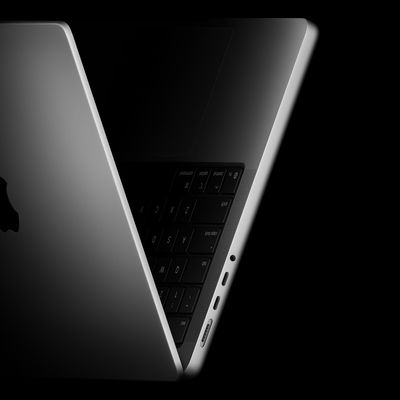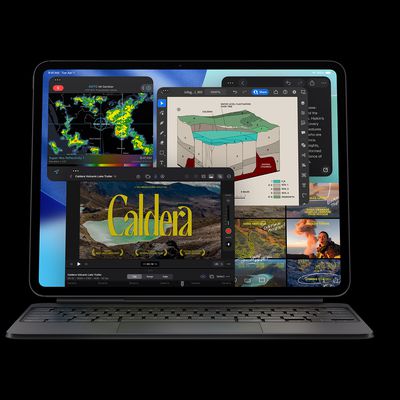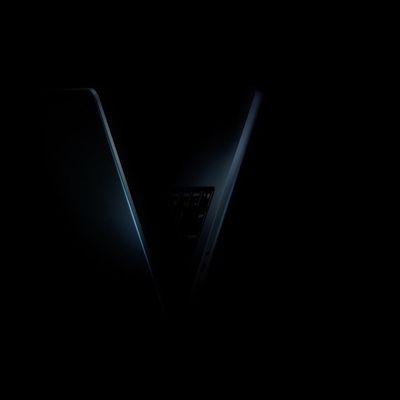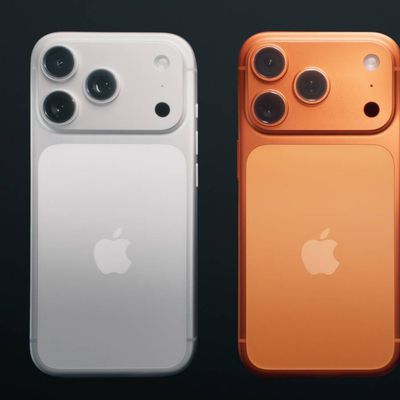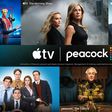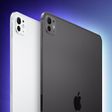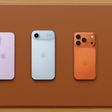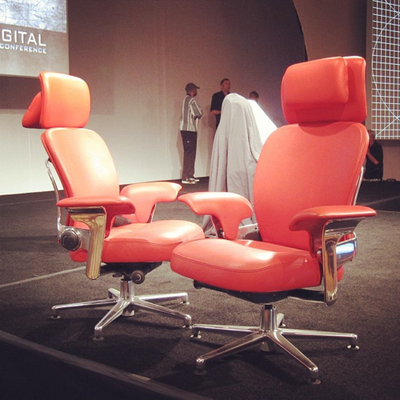
MacRumors will be providing live coverage of Apple CEO Tim Cook's interview with Walt Mossberg and Kara Swisher at D10: All Things D live this evening from Rancho Palos Verdes, California. The interview begins at 6PM Pacific / 9PM Eastern. It's the first major interview that Cook has given since he became CEO last August.
A number of Apple executives are also on the attendee list, including PR chief Katie Cotton and Senior Vice President of Marketing Phil Schiller, although they will not be speaking at the event.
All Things D was the only conference that Steve Jobs regularly attended where he sat down for public one-on-one interviews, including one famous sit-down where Jobs and Microsoft co-founder Bill Gates shared the stage.
The interview will not be live streamed, but videos of conference interviews have traditionally been available for viewing soon after the shows.
--
5:58PM - The room is filling and we're awaiting Tim, Kara and Walt. Katie Cotton was spotted speaking with Facebook COO Sheryl Sandberg.
6:01PM - "Ladies and gentlemen, please take your seats in the ballroom."
6:07PM - News Corp. COO Chase Carey is on stage congratulating All Things D on the 10th anniversary of D Conference.
6:10PM - "Please welcome your hosts, Walt Mossberg and Kara Swisher."
6:11PM - They're running a video showing a retrospective of the past 10 years of D Conference introductions.
6:13PM - "We thank you for supporting us all these years." A producer just brought a small cake out on stage to ironically "celebrate" their anniversary with a weak display of confetti.
6:15PM - Glee's Jane Lynch has come out to congratulate with a "backup plan" to celebrate 10 years of D. She introduced a full gospel singing group (The Saint James Concert Choir) to congratulate the D team on their 10 year anniversary.
6:20PM - A full New Orleans-style marching band (The Peninsula High School marching band) has arrived playing "When The Saints Go Marching In" ending with a massive blast of confetti.
6:22PM - Cook: "I wouldn't have come out after that if you had told me."
"What is the state of Apple under Tim Cook?"
It's an absolutely incredible time to be with Apple. I'm loving every minute of it. Never have I seen the things I can't talk about today. The juices are flowing. We have some incredible things coming out.
Of course the company, and what we're doing today, the company's very healthy. We've had a few decent quarters. The iPhone's doing great. We just finished the first half of our year and there are 70+ million more people out there that have iPhones now. The iPad has been unbelievable. I think we're in the first inning.
There's a few pretty much everywhere I go. The Mac has had a string of incredible quarters where we've outgrown the market.
Walt: From a small base though?
Cook: We're never going to make the most computers, but we're going to continue making the best.
The iPod introduced Apple to many people that didn't know Apple. The iPhone has introduced people to the developed world. The iPod introduced Apple to people in France and the UK and Australia and Germany. In 2007, the iPhone introduced Apple to people in China and the Middle East and Russia and Latin America.
It's been incredible as we've come out with more great stuff, the world has been introduced to Apple.
Walt: What's coming out next week?
That's a great question, but I'm not going to answer it.
Walt: But what's coming out?
Cook: Some great stuff!
"What do you mean about the first inning?"
Cook: That's simply about the iPad. I've always believed that the tablet market would be bigger than the PC market. Many people just laughed that off but today I think there's a lot more believers than that.
I bet there's a lot of people in this audience that use their iPad a lot more than they use their computer. And I love my Mac. But I find myself spending more and more time on my iPad.
Walt: The public at large is going to be introduced to a different approach from this to your friends in Redmond.
They're saying that a tablet is part of a continuum with a PC, and they're the same with different form factors.
What's wrong with that? Why is a tablet not a PC?
Cook: In my view, the tablet and the PC are different.
You can do things with a tablet if you aren't encumbered by the legacy of a PC -- if you view it as different. If you say this is another PC, all of a sudden you're pulling all of the leadweight of the PC market and you wind up with something not as good.
We invented the modern tablet. I love convergence, but products are about tradeoffs and you have to make tough decisions. The more you look at a tablet as a PC, the more the past affects the product.
I read this thing, you can converge a fridge and a toaster. I'm not introducing that next week. I think you wind up not building the best product in this particular case, when you try to converge those.
You have people trying to converge laptops and tablets. You're lugging this clamshell and tablet and the industrial design isn't optimized for this. People want tablets to be incredibly thin. If you look at it as a notebook, you're not going to come out of the design and have a kickass product and have people say WOW!
I think many people will select the tablet over the PC, so at a macro point of view they're connected. But if you force them together I think the PC isn't as good as it can be, and I think the tablet isn't as good as it can be.
Walt: One of the things that people are interested in is, obviously Apple has undergone a tremendous change with the death of Steve Jobs. You're the CEO. How is Apple different with you as the CEO, so far?
What did you learn from Steve?
Cook: I learned a lot from Steve. It was one of the saddest days of my life when he passed away.
As much as you could see or predict that, I really didn't. At some point late last year, somebody shook me and said "It's time to get on."
That sadness was replaced by this intense determination to resume the journey. We could be here all night, maybe a week or maybe a month. Focus is key. Not just in your company, but in your personal life as well.
Do many things great and cast aside everything else.
In the business we're in, own the technology. Steve was laser focused on that and that's ingrained in us.
Do things great, don't accept good. That's ingrained. Apple has a culture of excellence that is so unique. I'm not going to witness or permit the change of it.
He also taught me that the joy is in the journey. And he taught all of us that life is fragile. We're not guaranteed tomorrow, so give it everything you've got.
Kara: You don't want to live in a museum though?
Cook: Steve taught us not to focus on that past. Be future-focused. If you've done something great or terrible, go on and forget it and create the next thing and the next thing.
When I say I'm not going to permit any change, I mean the culture of Apple. This is something that is so special and so unique, it's not something that people can replicate. Not everyone can be like this.
Kara: They try.
Cook: They try, but you can't get a consultant report and replicate it. This is what I'm not going to change.
Walt: What have you changed? What's different?
Cook: Steve told me when he called me to his home about CEO, he said "I witnessed what happened at Disney when Walt passed away." He said people would go to meetings and say "What would Walt have done? What decision would he have made?"
He looked at me with those intense eyes that only he had, and told me to never ask what he would do. Just do what's right.
Does that mean that some things will be different? Yes.
But he would flip on something so fast, that you would forget that he was the person taking the 180 position a year before.
Kara: He did that on stage many times.
Cook: IT WAS AN ART! He did it many times and I saw it daily. This was a gift, because it takes courage to change. Maybe I was wrong before, maybe I was never right. It takes courage to do that.
Walt: What about changes, like the change in philanthropy?
Cook: My belief on philanthropy is...the Kennedys believed this, and I believe it..."to whom much is given, much is expected." Our policy allows us to give to many charities, and avoids bureaucracy. We let the employee decide and yes, we participate in other things, and I believe we can do even more. We'll talk about those things when we're ready.
Steve knew about the matching gift thing when he was alive and he was for it. Do I feel strongly about it? Yes, I do. I think it's impossible to say what he would or would not have done.
The dividend thing, some people have talked about this. I think we did the right thing. The company has been very successful, cash in the company has built up, and when we think about the things we want to do, we want to invest like crazy in R&D, invest in stores, other things I'm not going to talk about. But we've got some money left over and we should share it.
We're going to double down on secrecy on products. I'm serious.
However we're going to be the most transparent company in the world on some other things.
Walt: Like what?
Cook: Social change. Supplier responsibility. What we're doing for the environment. We're going to be so transparent in these areas because if we are, other people will copy what we're doing.
People will copy us on that and that's one area I want to be copied.
In the past we've had an annual report, and we've done more than others. But our communication was once per year. Now we're putting out monthly reports. We want everyone to know what we're doing.
Kara: Assess the China situation. You have many critics. How would you assess what you're changing with regards to manufacturing processes? Why isn't there an Apple-owned factory in China?
Cook: Let me take those one by one. We decided over a decade ago that there were things we could do better than everyone else. Those things we want to do ourselves. Some things other folks can do better than we can or as good as we can. Manufacturing was one of those.
The operational expertise and the engineering around it and the whole supply chain management stuff, Apple is doing all of that. Manufacturing, we looked at that and said "somebody else can do that as good as we can."
We put a ton of effort into taking overtime down. This probably sounds easy but it's hard because it's complex. Some people want to work a lot. Some people want to work a whole lot and work for a year or two and take as much money as they can back to their village.
We're at 95% compliance with overtime. We're measuring working hours for 700,000 people. I don't know anyone else doing this. And we're reporting this.
It's like the labor reports that the US works out. We put it out at the end of every month. We're micromanaging that. We're doing it in a way and showing a level of care that I don't see elsewhere. I think it's really important.
I hope people rip us off blindly on it.
Walt: There's been a lot of revival about the return of manufacturing in the US. You used to have factories and at least one in the US in Colorado somewhere. Do you ever see, as the most influential and biggest company in tech or any industry, and you're an operations expert. Will there be an Apple product made in the US?
Cook: I want there to be. The engines for the iPad and the iPhone are built in the US. Not just for the US, but for the world. In Austin. The glass is made in a plant in Kentucky. Not just in the US but for other markets too.
There are things that can be done in the US, not just for the US market, but can be exported.
There's an intense focus on the final assembly. They don't think about all of the parts underneath, where the significant value of the buildable material is. Can this be done in the US? I hope so, one day.
The tool and die makers in the US began to go down in the late 60's and 70's. How many tool and die makers are there in the US now?
I could call a meeting of all the tool and die makers into this room and we wouldn't fill it. In China you can fill cities with tool and die makers.
There needs to be a fundamental change in the educational system to bring back some of this -- but there are things we can do. The semiconductor industry is fantastic. The Corning deal with glass in Kentucky, it's fantastic. We will do as many of these as we can do.
We will use the whole of our influence to do this.
Walt: Will it ever say "Built in the USA" on an Apple product?
Cook: Maybe someday. It is important. I do want to point out something though. If you look at developers, think back to D1, D2, D3 through D5-D6 -- how many people talked about mobile apps?
Now it's mainstream. Now there are hundreds of thousands of people developing apps. This whole segment of the economy didn't exist a few years ago. Now, incredible innovation is going on in mobile apps. From an app point of view, if you're looking at innovation on the PC, you're hard-pressed to come up with companies innovating on the PC. I feel that we are, but the list is small.
You'd need football stadiums to have a meeting of all the app developers.
Kara: Why have a PC then?
Cook: The tablet wouldn't replace all needs for PC's and Macs. What I see is that the tablet, for some people, takes over what their PC was about. And it may extend the purchasing cycle for others. "I want both, but I've got a budget, so I'll buy tablets more often than I buy PC's."
Kara: Let's talk about the patent wars. Is that a problem for innovation?
Cook: It's a pain in the ass. Is it a problem for innovation? From our point of view, it's important that Apple not be the developer for the world.
We don't want to put all of ourselves in a painting and have someone else put their signature on it. If you're an engineer, the worst thing is for you to put your life into something and have someone else rip it off and put their name on it. We just want people to invent their own stuff and not rip us off.
Walt: Other people are saying you're ripping them off too. People are suing you too.
Cook: The vast majority of those are on standards essential patents. Standards essential patents come with a responsible manner to license them. Like a patent to connect to a 3G data network -- there's no way to connect to the network without using this patent. The issue is that this is an economic argument -- no one should be able to get an injunction off a standards essential patent. The owner has a responsibility to license it in a fair, reasonable manner. When someone comes to you and asks for an obscene level of money from you. They're telling you they want to get an injunction against you and use the court system like that. In my view using it in a way not intended.
Walt: You're saying when you sue somebody, they've signed your painting and nobody else is suing you because you've signed their painting.
Cook: I don't want to put words in their mouth -- but Apple has not sued anyone over standards essential patents that we own. We view it as fundamentally wrong to do that. That was never the intention of that kind of patent. The intention is over payment.
The problem in this industry is that if you add up what everyone says the patents are worth, no one could be in the phone business! They'd be priced out. It's gotten crazy.
Some of this is maddening. It's a waste. It's a time suck. However, does it stop innovation? It's not going to stop us. But it's overhead that I wish didn't exist.
Walt: You just had settlement talks with Samsung.
Cook: I read that in the paper, but I can't talk about it.
Kara: How do you like Google's painting? Pretty? Tacky?
Cook: I love Apple's painting.
Kara: What about Google's painting? Or RIM's painting?
Cook: I don't want to talk about other companies. You brought up patents, and it's something I'm passionate about. I think that's an abuse of the system and something that's not intended. I hope it can be fixed. I hope the regulators will charge at this and fix it.
Kara: You dominate influence and money-making in smartphones.
Cook: I wouldn't say we dominate it. I think we have the best phone. You have two operating systems today that make up the vast majority -- iOS and Android. You have Windows Mobile beginning to ship and we'll see how they do. Then you have RIM, that is still serving some large number of enterprise customers.
The momentum is in the first two. Will that change? I think that anything can change. I think we're in the early stages of the smartphone revolution. When you back up and look at this, this market is a billion unit market in three years. A few years after that, you won't see many phones that aren't smartphones. The opportunity here is huge. There clearly can be changes along the way.
Walt: One thing that's been happening a lot on the Android side, they're looking to make fewer models.
Cook: I wonder where they got that idea.
Walt: They're looking to focus. They've yet to have, given the Samsung Galaxy S II was the bestselling Android smartphone, they really haven't had a phone, the single model that's a hit like the iPhone.
On the other hand, Apple has this hit phone with a platform, but only has one new phone at a time. I know you sell last year's model for $99 and the year before for $0. At any one time, there's only one new iPhone. That's not the way it was done with the iPod or the Mac.
Why don't you have more than one iPhone and more than one iPad?
Cook: Our North Star is to make the best product. Our objective isn't to make this design for this kind of price point or to make the design for this schedule or line up other things or have X number of phones.
It's to build the best.
We have an overriding belief of making the best and so if we find we can do more, great. Do we have to? One of our advantages is that we're not fragmented.
If you look at our iOS, like iOS 5, it's amazing how many users are on the latest OS. Our App Store is simple and straightforward. We have one phone with one screen size and one resolution. It's pretty simple if you're developing for this platform.
Walt: Your people said "We've got all these price points covered" with iPods. They aren't junk. Lot of the world can't afford $200 phones. Why couldn't or shouldn't you make a $99 new iPhone that's designed around that point for a certain kind of market?
And be just as proud of it?
Cook: Who knows what we're going to do in the future? I'm not going to conjecture about that. We didn't sit around the iPod and say "we need a $49 model." It was "we could have a pretty cool model called the Shuffle." Whenever we can do some fantastic models and they're at different price points, that's great.
Kara: Aren't folks saying couldn't we have a bigger screen?
Walt: Or an iPad with a 7" screen?
Kara: Let's talk about TV. Steve talked a lot his last appearance here about wanting to change television. How are you looking to change television?
Cook: We've stayed in the Apple TV business. That's unusual for us. We're not a hobby kind of company. We put all our wood behind a few arrows.
If something creeps in and isn't a big success we put our energies somewhere else.
Apple TV, though, you can see what we've done. We've stuck in this. It's not a fifth leg of the stool. It's not of the same market size as the phone business or the Mac business or music or tablet business. It's not like that.
But, last year, we sold 2.8 million Apple TV's. This year, in the first 6 months, we've sold 2.7 million. We've almost equalled last year.
That was helped by 1080p and movies in the cloud. It's a key part of the ecosystem. This is an area of intense interest for us. Many of us, the TV that we do watch, is almost exclusively on it. That's what my TV watching is. All of my movies, everything is coming through Apple TV.
So, the customer satisfaction with that product is incredible. We're going to keep pulling this string and see where it takes us. Many people would say "this is an area in their life that they aren't pleased with." They might not be pleased with many things about it. The whole TV experience. It's an interesting area. We'll have to see what we do. Right now our contribution is Apple TV.
Walt: There's been a ton of things written about a television set. Let's not be coy. The whole box with the big panel in it. If you forget about the set top boxes, the TV has a user interface that looks nothing like what one would think was a good interface and there's lots of issues with it.
OK I'll ask: Are you making a television?
Cook: You're right, I'm not going to answer that question.
Walt: Is it possible to build a box and ignore the rest? Not build a TV but just build the box?
Cook: We would look at this and say can we control the key technology? Can we make a significant contribution beyond what others have made in this area? Can we make a product that we would all want? That's all thing we would ask about any new product category. It's the ones we ask about products within families we're thinking about now.
Kara: Is Apple TV today good enough? Does it please you?
Cook: I love the product. But I think Apple TV is more something that you keep pulling the string to see where it goes.
Walt: To be honest, I use mine a lot but you don't have a lot of content on there.
Cook: We have a lot of content. You've got Netflix on there.
Walt: I own it, I've used it. There's not a lot of content on there compared to other people's boxes.
Cook: There's 16 or 17,000 movies on there, it's incredible.
Walt: You don't stream them, I've gotta buy it. Everyone has Netflix, that's table stakes. You're not solving every problem that folks have with your current product.
Cook: I agree.
Walt: You talk about owning core technologies. What's the core tech in TV?
Cook: I'm not going to get into that. Kara, what question to do you have?
Kara: What's the core technology in TV?
Cook: *laughs* You guys are good.
Kara: How's your approach with Hollywood? Steve was big down there.
Cook: We have a good relationship. We have great respect for content owners. We don't want their stuff to be ripped off. This is the way we felt about music. We wanted to provide a simple and elegant way for people to buy them.
We felt that the vast majority of people were honest and if they had that they would be.
A whole generation was growing up that thought it should be free. If that continued you wouldn't have any artists. If that happens to movies, we won't have any great movies anymore.
Kara: So you think the relationship is good.
Cook: I think it's good. They view us positively because we do care. These are long term customers that were with Apple before the iPhone or iPod or iPad. There's a level of trust in those relationships. Steve brought us even closer because he owned a content business for a while. That thinking and that way of looking at it helps us.
Kara: What would they dislike about you?
Cook: Ask them.
Kara: I will, tomorrow night. But what might they say?
Cook: I don't know. I've met with several of them recently and there were great conversations because we were talking about what more we could do together.
Walt: Are you working on some other sort of content service that I can use in the living room?
Cook: What question did you have Kara?
Walt: Every time you say that we assume the answer is yes.
Kara: What do you think about how Google and Netflix are funding original content?
Cook: I don't think Apple should be in the content business. We haven't had an issue for the most part in getting content. We have 30 million songs, virtually every song out there. Movies and TV shows get difficult because you have separate ownership in each country. For the most part, getting content isn't an issue. I think that there is a great art to doing content right. I have great appreciation for the content. This is an area where Apple partnering well is the right approach. Not making content. For funding, the greatest thing we can provide is to sell a lot of their stuff. If we can make an elegant solution with their content, that's the best thing we can do for all parties.
Walt: What is going on between you and Facebook?
Cook: Facebook is a great company I have great appreciation for them.
Walt: But, on my Apple devices, Twitter comes up automatically. Facebook has 900 million users, why can't I do that?
Cook: Our relationship is very solid. I saw Sheryl earlier and you can ask her on our break. Stay tuned on this one.
Kara: Are they still onerous, as Steve said?
Cook: They have their own style.
Kara: Aren't you kind of must haves for each other?
Cook: For us, we want to provide customers simple and elegant ways to do the things they want to do. Facebook has hundreds of millions of customers. So, anyone that has an iPhone or iPad, we want them to have the best experience with Facebook on those platforms.
So stay tuned.
Kara: Do you see more acquisitions under the Tim Cook regime?
Cook: We continue to buy companies. They aren't ones we seek to make public.
Kara: Eventually you have to tell us.
Cook: Depends on the value. If I don't have to, I won't. That's part of the doubling down.
Walt: You're going to out-secret Steve Jobs?
Cook: Secrecy on the product side is so important-
Walt: You're killing me.
Kara: When you look at big companies that you have to disclose, did you look at Instagram?
Cook: We didn't. I wouldn't rule it out, but we're not looking at a big one right now. I wouldn't rule it out.
Historically, we haven't bought a company for a revenue stream. We buy them for good people, cool IP, or a synergy with a product we're working on. Maybe they have great skills that we can redeploy or a great feature for a product. We'll do more, there's no doubt. I wouldn't say we'd never do one for revenue but that's not how we're wired.
Kara: You're with most internet companies on that. You'd be perfect buying Instagram.
Cook: Maybe that's true.
Walt: Siri. It's in your ads, it's your principle way of selling the iPhone 4S which has sold large numbers. John Malkovich, Sam Jackson. When it works, it works really well. It's kind of like magic. But a lot of times it doesn't work. That's not what a lot of people have come to think about Apple products. It gets things wrong or can't understand you. And it's a Beta. Is that up to your standards?
Cook: Customers love it. It's one of the most popular features of our most popular product -- the most popular phone in the world. But, there's more that it can do. We have a lot of people working on this. You'll be really pleased with the things you'll see over the coming months. The breadth that you're talking about -- we've got some cool ideas about what Siri can do. We have a lot going on on this.
Kara: Is voice critical going forward?
Cook: Siri proves that people want to relate to the phone in a different way. There wasn't a lot of invention in the input. Then touch came along and was cool and new. I think voice -- particularly when it understands context not just voice recognition -- but what makes Siri cool is that she has a personality. She becomes many folks' best friends.
Walt: Isn't that a bit sad?
Cook: I'm not one to judge.
Kara: A woman not listening to me is the story of my life.
Cook: I think it's profound. It's not voice recognition -- it's the AI. That's what's profound. This is something that people have dreamed of for years. Yes, it could be broader and so forth. But, we see unbelievable potential here and Siri as a feature has moved into the mainstream. People hear "Siri" and people know what you're talking about. It's amazing this has come since October.
I think you'll be really happy with where it's going.
Kara: I asked this question of Steve, what he does all day. He gave a fantastic answer. What do you do all day? What's your role at Apple on a daily basis? Do you consider yourself a visionary? That was stuck on Steve.
Cook: Steve was genius and a visionary. I never viewed my role as to replace him. He was an irreplaceable person. Steve was an original and there isn't another one of those being made. I've never felt the weight of trying to be Steve. It's not who I am and it's not my goal in life. I am who I am. I'm focused on that. It's incredible every day to work with the smartest and most innovative people on earth. I spent my day working with those people on many different things -- some we didn't talk about, that you wanted to talk maybe -- and many things that go with running a company of Apple's size. All the geographies we're in. I love every minute of it. It is my oxygen. That's how strongly I feel about it.
Walt: Who's the curator these days at Apple? Steve was the curator or editor on these products.
Cook: We have a privilege, because if I look around the executive team, many of the people are the people I've been working with for double digit years. We all know each other very well and have great respect for each other.
The curator role moves, as it's always moved.
Walt: It was a myth that he did it all.
Cook: He said that no one person could do it all. Look at what we're doing, it's not possible. You could have an "S" on your chest and a cape and you couldn't do it all. He brought great people to the company and set a standard for who they brought in. That built an incredible company. He brought that foundation and his spirit will always be in the DNA of the company. I wouldn't get overly focused on who does what piece. The company doing all the things we're doing, there are a lot of key people.
Kara: What's your goal? To become at trillion dollar company? Be very secretive? Create your own CIA?
Cook: I just want to build great products. There's not a specific revenue goal. I think if we do that, the other things follow. Companies that get confused and think their goal is revenue or a certain profit or whatever, or a stock price of something -- those things you can't focus on and make better. You have to focus on the things that lead to those. For us, that's all about great products. All of our energies are on that, not the result of that.
Kara: Looking out at the non-Apple, what do you look up to? A person or a company?
Cook: Like heroes? Ones that are deceased or ones that are living? If you walked into my office, you would see Bobby Kennedy and Martin Luther King. That's who you would see.
CEO's that are living that are doing fantastic jobs? I have incredible respect for Bob Iger and what he's done at Disney. It's a great fortune for us to have him on our board. I've had great opportunities to meet people I hadn't known before then.
Q&A
During a brief Q&A session, we asked Cook about his views on the coverage Apple receives from news and rumor sites: "You talk a lot about the emotion of the customers, there's a lot of passion amongst customers. Do you think the sort of attention that's paid to Apple from rumor sites and news sites and everybody is a distraction or a driver? How does that affect you and the company?"
Cook: I think it's a privilege to have people that care about the company and care enough to write, care enough to talk, and care enough to send me an email and say "you're out to lunch on this thing" and "you should be looking at this differently".
I think all of that is great, I love it. And, do I want something printed on a website that's printed on a website that's confidential? No. But I don't think that's what you're asking.
I view our ecosystem as including great sites that care deeply about the company and want to inform customers. I have no problem with people that disagree with things that we're doing. That's our country and I love it. It's great that we have disagreements.
Does that make sense?




